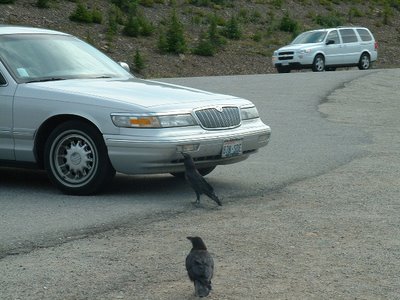First, a reader writes,
[If] we were to affirm, would major corporations such as McDonalds and Burger King be in violation of these rights, and if they were, would they be shut down by the government, costing thousands of people their jobs and adding to the country's unemployment rate?This is one of the most critical points in this resolution: it doesn't define the nature or scope of animal rights. For all we know, animals could only have negative rights of a fairly limited extent, such as the right not to suffer cruel and unusual treatment. (It may seem morally strange to allow a person to kill and eat something, provided it doesn't suffer while alive, but that's just one of the morally strange things about trying to blend carnivorous and animal rights.)
So, unless animal rights include a "right not to be killed," we simply can't answer the question.
Next, reader nesh asks, "Didn't we as humans create this system of justice that the resolution speaks of?"
That's a great question that won't find an easy answer. In this view, rights are socially constructed. They're invented by humans, for humans--but this also makes rights a matter of human whim, changing with times and cultures. This gets tricky quickly, leading to cultural / moral relativism, and slippery grounds for disapproving of moral horrors like murder or rape.
Even if rights are human constructs, does it follow that animals are excluded from rights-talk? Not necessarily. There may be a good reason--a utilitarian or pragmatic reason--to extend rights to animals so that all humans benefit. More on this later.
A less constructivist approach is to argue that rights exist independent of human thought, but are discovered by rational actors, much as mathematical concepts exist on their own plane, waiting to be plucked out by mathematicians. Humans might disagree on the nature of rights, but they can't merely construct them. Animal rights could exist in a like manner, waiting for the first John Locke of the dolphins to squeak out a treatise. Even if such an event never occurs, however, a creature that can articulate animal rights--a human being--already exists, and can potentially assign those rights to animals.
An anonymous reader writes,
I do not like anything on the aff side... people will say that there are animals with "near human intelligence" and like arguments. This is not a good argument on several levels... First, that only occurs in certain cases. Not a true reason to affirm, and secondly if they were so smart they would protect their own rightsGiving animals rights for inherent reasons--they're intelligent, they can suffer, they're cute and fuzzy--is only one approach. Another is utilitarian, as I mentioned above: when we assign rights to animals, we protect their welfare, which not only improves their lives (and the environment), but may make us more moral as human beings. To wit, a person who treats animals with respect is more likely to treat humans with respect. (The opposite may be true as well; stereotypically, it's the psychopathic serial killer who's cruel to animals at a young age.)
Furthermore, an ethicist like Peter Singer will argue that the same reasons we defend the rights of defenseless, pre-rational human babies can be extended to the defense of non-rational animals.
As a different anonymous reader writes later on,
As for the justice approach, you're gonna have to be specific about the definition of justice, or what justice really is and what it applies to. Is justice a human-only concept? If we talk about justice and its benefits, is it utility for humans only? and if it is or isn't, why?Amen and amen.
I'm running out of time at the moment, so I'll stop there for now. More questions, and concomitant answers, coming soon.
